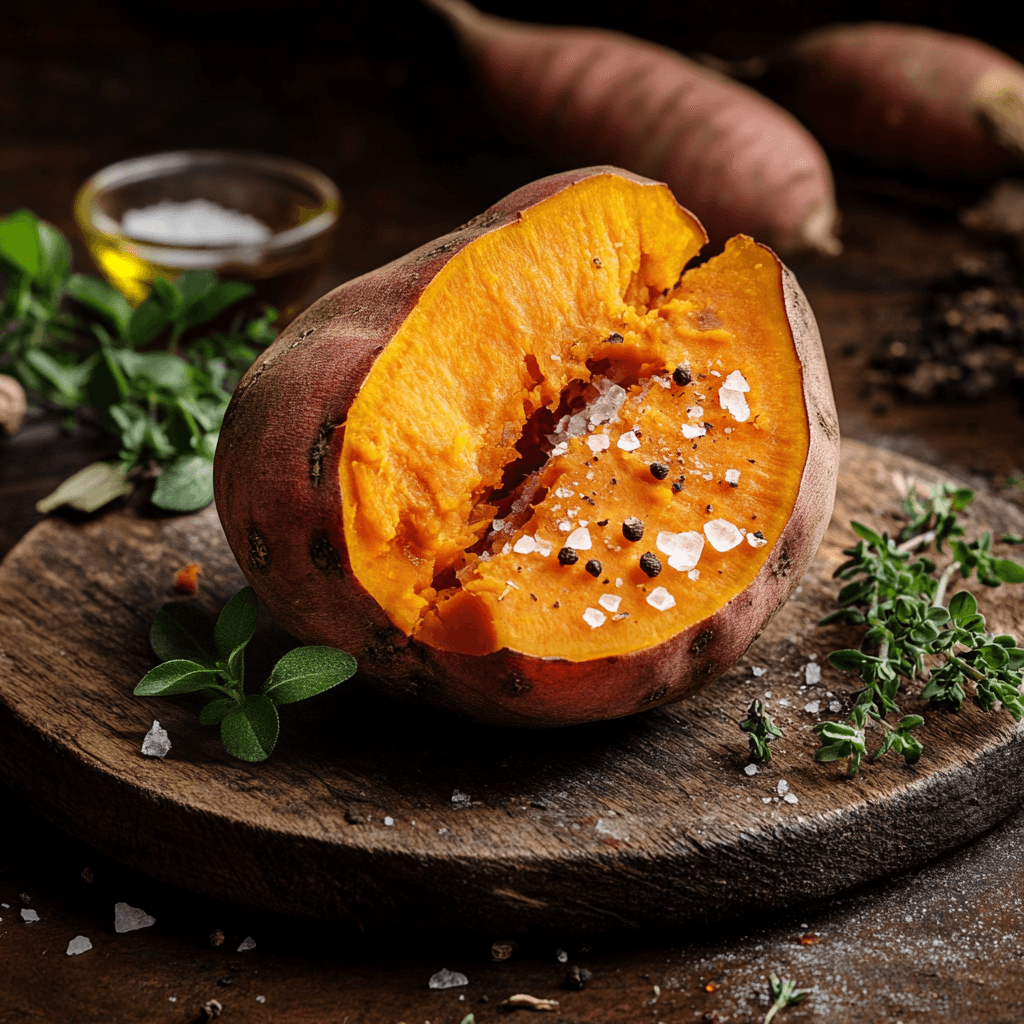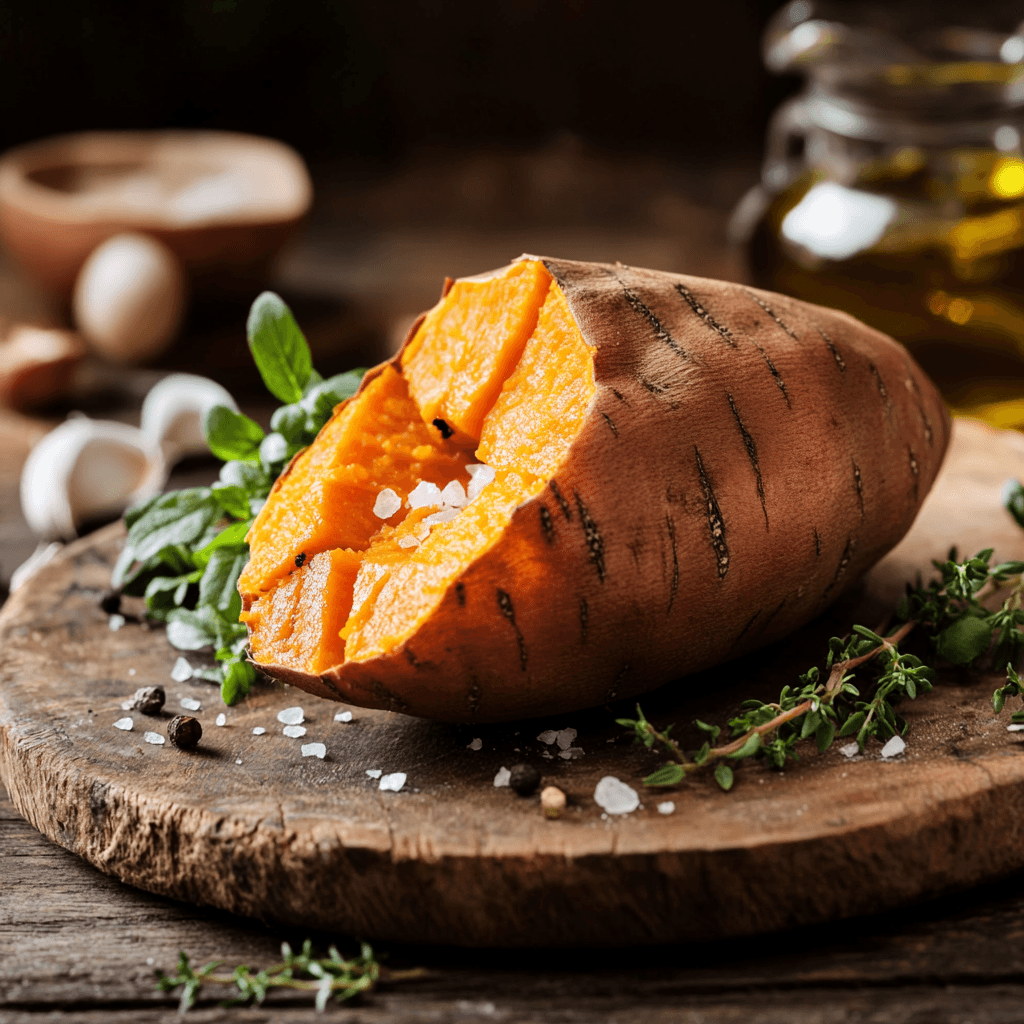Sweet Potatoes Benefits: Sweet potatoes are starchy root vegetables renowned for their sweet flavor, versatility, and impressive nutrition profile. Originating in Central and South America, sweet potatoes have become a staple food in many cuisines worldwide. These tubers form the basis for both savory and sweet dishes, showcasing their adaptability. Sweet potatoes thrive in various climates, serving as a vital food source for many communities. Furthermore, sweet potatoes are celebrated for their numerous health benefits, earning them recognition as a superfood. With their growing popularity among health-conscious individuals, sweet potatoes continue to stand out as a nutritious and versatile dietary choice.
Table of Contents
Nutritional Profile of Sweet Potatoes
Sweet potatoes are packed with essential nutrients, making them a nutritious addition to any diet. They are an excellent source of complex carbohydrates, dietary fiber, and an array of vitamins and minerals. Key highlights include:
- Vitamin A: Sweet potatoes are exceptionally rich in beta-carotene, which the body converts into vitamin A, supporting eye health and immune function.
- Vitamin C and E: These antioxidants help combat free radicals, promoting skin health and overall immunity.
- Potassium and Magnesium: Essential for maintaining healthy blood pressure and muscle function.
- Dietary Fiber: Promotes digestive health and aids in maintaining a healthy gut. Sweet potatoes are also low in fat and cholesterol, making them an ideal choice for balanced meals that cater to a range of dietary preferences.
Medicine?
In traditional medicine systems such as Traditional Chinese Medicine (TCM) and Ayurveda, practitioners classify sweet potatoes as neutral to slightly “warming” foods. Their gentle sweetness and nutrient-dense composition harmonize “cold” and “hot” conditions in the body. However, this classification often depends on preparation methods and regional practices. People frequently consume sweet potatoes to nourish and energize the body without generating excessive heat or cooling effects.
The Role of Sweet Potatoes in Ayurveda
Ayurveda identifies sweet potatoes as madhura rasa (sweet taste) foods that ground and stabilize. Practitioners believe they:
Pacify Vata and Pitta doshas: Their natural sweetness and moisture soothe Vata’s dryness and calm Pitta’s heat.
Provide energy: Sweet potatoes help build ojas (vital life energy), supporting recovery and vitality.
Support digestion: Their slightly warming nature, combined with easy digestibility when cooked, enhances their therapeutic benefits.
Ayurvedic experts often recommend sweet potatoes as versatile foods that suit most constitutions, especially when paired with spices and prepared thoughtfully.
Sweet Potatoes and Traditional Chinese Medicine (TCM)
In TCM, experts regard sweet potatoes as moderately “warming” foods that strengthen the Spleen and Stomach meridians. Some key benefits include:
Promoting harmony: Their balanced properties help restore equilibrium, particularly in transitional seasons like autumn.
Boosting Qi energy: Sweet potatoes enhance energy levels and promote vitality.
Aiding digestion: They regulate digestion and provide support for individuals with weaker digestive systems.
The Thermal Nature of Sweet Potatoes
Are Sweet Potatoes Considered “Cold” or “Hot” Foods in Traditional Is Sweet Potato Cold or Hot? Exploring Its Role in Traditional Medicine
Sweet potatoes have been integral to traditional medicine systems like Ayurveda and Traditional Chinese Medicine (TCM), where they are classified as neutral to slightly “warming” foods. Their ability to harmonize “cold” and “hot” conditions in the body makes them a versatile choice for nourishing and energizing diets.
Sweet Potatoes in Ayurveda
In Ayurveda, sweet potatoes are considered madhura rasa (sweet taste) foods with grounding and stabilizing effects. Practitioners believe that sweet potatoes can:
- Pacify Vata and Pitta doshas: Their natural sweetness and moisture soothe Vata’s dryness and calm Pitta’s heat.
- Provide Energy: Sweet potatoes contribute to building ojas (vital life energy), enhancing recovery and vitality.
- Support Digestion: Their slightly warming nature and easy digestibility make them ideal for therapeutic purposes.
Ayurvedic experts often pair sweet potatoes with spices like cinnamon or ginger to enhance their warming properties. For more creative ideas on incorporating these warming foods into your meals, visit Sweet Potato Pie Serving Tips.
Sweet Potatoes in Traditional Chinese Medicine (TCM)
In TCM, sweet potatoes are valued as moderately warming foods that strengthen the Spleen and Stomach meridians. Key benefits include:
- Promoting Harmony: Their balanced properties restore equilibrium, especially during transitional seasons like autumn.
- Boosting Qi Energy: Sweet potatoes enhance the body’s energy levels and vitality.
- Aiding Digestion: They regulate digestion and are suitable for those with weak digestive systems.
If you’re exploring traditional recipes that incorporate sweet potatoes, try the comforting Sweet Potato Pie as a way to experience their warming properties.
Misconceptions About Sweet Potatoes’ Thermal Properties
Despite being mildly warming, sweet potatoes do not produce excessive heat. Their effects are subtle, promoting internal balance. Preparation methods play a critical role in intensifying or balancing their thermal qualities. Boiling sweet potatoes preserves their neutral properties, while roasting enhances their warming effect. Learn more about how cooking impacts food properties in Sweet Potato Pie Serving Tips.

Sweet Potatoes in Modern Diets
How Cooking Methods Impact the Thermal Nature of Sweet Potatoes
The thermal nature of sweet potatoes changes based on the cooking method used. Sweet potatoes retain their neutral to slightly warming properties when steamed or boiled, preserving their natural balance. Baking or roasting sweet potatoes at high temperatures intensifies their warming qualities, making them a better choice for colder climates or for individuals seeking extra heat in their diet. Frying sweet potatoes, on the other hand, significantly increases their warming nature, turning them into a strongly “hot” food. This transformation may not be suitable for people dealing with excessive internal heat. Understanding how to prepare sweet potatoes allows you to maximize their benefits while aligning with your dietary needs.
Understanding these shifts allows individuals to tailor their preparation methods based on seasonal and personal health needs.
Sweet Potatoes: A Versatile Ingredient in Balanced Diets
Sweet potatoes play a prominent role in modern diets due to their adaptability. They provide a nutrient-rich, naturally sweet ingredient that complements various culinary traditions and dietary patterns. Key aspects include:
- Health Benefits: They deliver antioxidants, fiber, and essential vitamins that support weight management, boost immune health, and provide sustained energy.
- Culinary Flexibility: People can mash, bake, fry, or incorporate sweet potatoes into soups, desserts, and smoothies, making them suitable for diverse preferences.
- Dietary Inclusivity: These tubers accommodate gluten-free, vegan, paleo, and plant-based diets, while those on keto can enjoy them in moderation.
Sweet Potatoes and Health Benefits
Is Sweet Potato Hot or Cold? Understanding Its Traditional Role
Sweet potatoes are a popular choice in traditional medicine, offering versatile benefits that adapt to various health needs. Their classification as “hot” or “cold” depends on preparation methods, individual constitution, and cultural practices.
Ayurveda’s Perspective on Sweet Potatoes
In Ayurveda, these root vegetables are regarded as madhura rasa (sweet taste) foods. Known for their grounding effects, they pacify Vata and Pitta doshas, provide energy, and support digestion. Pairing them with spices enhances their warming qualities.
Sweet Potatoes in Traditional Chinese Medicine (TCM)
TCM categorizes sweet potatoes as moderately warming, benefiting the Spleen and Stomach meridians. They promote harmony, boost Qi energy, and aid digestion, making them a staple during cooler seasons.
Misconceptions and Preparation Effects
While sweet potatoes are mildly warming, they do not create excessive heat. Cooking methods such as boiling maintain neutrality, while roasting intensifies their warming effect. For additional tips, explore recipes like Sweet Potato Pie.g excessive internal heat.
Misconceptions About Sweet Potatoes and Body Heat
Several myths exist about sweet potatoes and body heat:
- Overgeneralization: While sweet potatoes are warming, they are not excessively “hot” and suit most individuals.
- Cooking Methods: Boiling maintains neutrality, while roasting or frying intensifies their warming properties.
- Confusion with Spicy Foods: Unlike chili peppers, sweet potatoes provide gentle and harmonizing effects.
Related Articles for Further Reading
- Learn how to pair sweet potatoes with other dishes in Sweet Potato Pie Serving Tips.
- Explore sweet potato recipes like Sweet Potato Pie.
- Discover more about incorporating root vegetables into your diet at Element Recipes.
Conclusion
Summarizing the Thermal Properties of Sweet Potatoes
Sweet potatoes are a versatile and nutritious food that strikes a balance between tradition and modern nutrition. In the context of their thermal properties:
- Moderate Warming Effect: Sweet potatoes are classified as mildly warming foods in traditional systems like Ayurveda and Traditional Chinese Medicine. They support internal energy balance without causing excessive heat.
- Adaptable Nature: Their thermal qualities can shift based on preparation methods, making them suitable for different seasons and individual needs.
- Digestive Harmony: Their gentle nature promotes digestive health and provides a nourishing energy boost, contributing to overall well-being.
Sweet potatoes embody the concept of balance, offering a harmonious blend of warming and neutral properties that benefit a wide range of individuals. Whether used in traditional or modern diets, they remain a valuable addition to health-focused meals.


